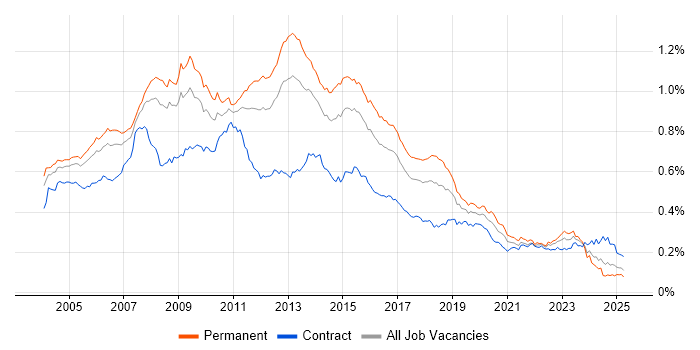SQL Database Administrator
UK
The median SQL Database Administrator salary in the UK is £52,500 per year, according to job vacancies posted during the 6 months leading to 5 May 2025.
The table below provides salary benchmarking and summary statistics, comparing them to the same period in the previous two years.
| 6 months to 5 May 2025 |
Same period 2024 | Same period 2023 | |
|---|---|---|---|
| Rank | 644 | 705 | 692 |
| Rank change year-on-year | +61 | -13 | +194 |
| Permanent jobs requiring a SQL DBA | 43 | 211 | 287 |
| As % of all permanent jobs advertised in the UK | 0.082% | 0.21% | 0.28% |
| As % of the Job Titles category | 0.090% | 0.23% | 0.30% |
| Number of salaries quoted | 43 | 197 | 247 |
| 10th Percentile | £45,250 | £50,000 | £36,250 |
| 25th Percentile | £46,750 | £53,750 | £45,125 |
| Median annual salary (50th Percentile) | £52,500 | £57,500 | £55,000 |
| Median % change year-on-year | -8.70% | +4.55% | +10.00% |
| 75th Percentile | £63,125 | £61,250 | £60,875 |
| 90th Percentile | £70,000 | £65,000 | £67,500 |
| UK excluding London median annual salary | £50,000 | £57,500 | £55,000 |
| % change year-on-year | -13.04% | +4.55% | +20.88% |
All Permanent IT Job Vacancies
UK
For comparison with the information above, the following table provides summary statistics for all permanent IT job vacancies. Most job vacancies include a discernible job title that can be normalized. As such, the figures in the second row provide an indication of the number of permanent jobs in our overall sample.
| Permanent vacancies in the UK with a recognized job title | 47,606 | 93,229 | 94,684 |
| % of permanent jobs with a recognized job title | 90.38% | 94.63% | 91.53% |
| Number of salaries quoted | 27,326 | 66,845 | 59,589 |
| 10th Percentile | £30,000 | £28,500 | £32,500 |
| 25th Percentile | £42,000 | £38,500 | £45,000 |
| Median annual salary (50th Percentile) | £57,500 | £52,500 | £60,000 |
| Median % change year-on-year | +9.52% | -12.50% | - |
| 75th Percentile | £75,000 | £71,250 | £81,250 |
| 90th Percentile | £97,500 | £90,000 | £100,000 |
| UK excluding London median annual salary | £52,000 | £50,000 | £53,000 |
| % change year-on-year | +4.00% | -5.66% | +6.00% |
SQL DBA
Job Vacancy Trend
Job postings that featured SQL DBA in the job title as a proportion of all IT jobs advertised.

SQL DBA
Salary Trend
3-month moving average salary quoted in jobs citing SQL DBA.
SQL DBA
Salary Histogram
Salary distribution for jobs citing SQL DBA over the 6 months to 5 May 2025.
SQL DBA
Top 13 Job Locations
The table below looks at the demand and provides a guide to the median salaries quoted in IT jobs citing SQL DBA within the UK over the 6 months to 5 May 2025. The 'Rank Change' column provides an indication of the change in demand within each location based on the same 6 month period last year.
| Location | Rank Change on Same Period Last Year |
Matching Permanent IT Job Ads |
Median Salary Past 6 Months |
Median Salary % Change on Same Period Last Year |
Live Jobs |
|---|---|---|---|---|---|
| England | +46 | 32 | £55,000 | -4.35% | 10 |
| UK excluding London | +65 | 30 | £50,000 | -13.04% | 6 |
| Work from Home | +45 | 27 | £48,500 | -15.65% | 6 |
| London | +86 | 8 | £56,250 | -16.67% | 5 |
| Midlands | +41 | 8 | £48,500 | -15.65% | 1 |
| East Midlands | +37 | 8 | £48,500 | -15.65% | |
| Scotland | +117 | 7 | £47,500 | -17.39% | |
| North of England | +29 | 7 | £56,500 | -1.74% | |
| South West | +94 | 4 | £62,500 | +8.70% | |
| South East | +81 | 4 | £55,000 | -4.35% | 5 |
| North East | +44 | 4 | £60,000 | +4.35% | |
| North West | -7 | 2 | £37,500 | -31.82% | |
| Yorkshire | +66 | 1 | £55,000 | -4.35% |
SQL DBA Skill Set
Top 30 Co-occurring Skills and Capabilities
For the 6 months to 5 May 2025, SQL DBA job roles required the following skills and capabilities in order of popularity. The figures indicate the absolute number co-occurrences and as a proportion of all permanent job ads featuring SQL DBA in the job title.
|
|
SQL DBA Skill Set
Co-occurring Skills and Capabilities by Category
The follow tables expand on the table above by listing co-occurrences grouped by category. The same employment type, locality and period is covered with up to 20 co-occurrences shown in each of the following categories:
